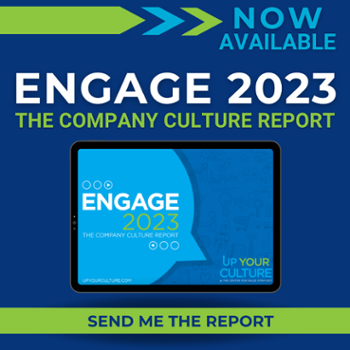
People are leaving their jobs in droves. But we can’t blame the pandemic — the roots of this problem are planted firmly in culture.
A recent McKinsey survey found that almost two-thirds of employees said that the pandemic has caused them to reflect on their purpose in life. And 70% of employees said their purpose is defined by their work.
No wonder people are taking this time of reflection to find a place to work that is packed with purpose!
We have heard a lot about the “Great Resignation” or the “Great Quit.” I think of it more like the “Great Reshuffle,” but regardless of what you call it, it’s real – and it has been very difficult for many businesses.
Like other historical challenges, I believe this one will come with a significant silver lining. Companies will make their culture a priority, and people will find a greater sense of meaning in their work.
We'll all be better off in the end.
What is Company Culture and why does it matter so much?
 Think of your company culture as “the way you do things” there. It's the personality of your organization and the vibe you get when working there.
Think of your company culture as “the way you do things” there. It's the personality of your organization and the vibe you get when working there.
Every organization has a culture. The question is simply whether that culture is intentional and built by design, or whether it developed as a default in the void of any clear direction. Those that are intentional tend to be significantly better than those left to grow in the wild and the difference between the two is greater than most would imagine.
The stronger the culture, the higher employee engagement will be, and when they are engaged, they are significantly more productive. An engaged employee feels as though they have a stake in the game. They know what they are playing for and what success will look like, so they are willing to give it everything they've got.
Howard Schultz, founder, and former CEO of Starbucks, explained this by saying, “When you’re surrounded by people who share a passionate commitment around a common purpose, anything is possible.”
The most common side-effect of a bad culture is employee turnover. Talented people simply don't want to work in a toxic environment, and they are rarely willing to align themselves with a company that doesn’t share their values. Who wants to deal with office gossip or middle-school-like cliques that divide the workforce? Your top performers sure don’t, and they can afford to be choosy. They’re more likely to quit – even if they are well-paid.
Put A Plan In Place To "Up" Your Culture And Employee Engagement
Consider whether the following strategies can help:
Shared Mission:
- Clearly define a strong Reason for Being (or Purpose Statement) and Core Values to guide your business and connect your people.
- Communicate regularly to your employees about the importance of their work to the customer, the company, and the community to help them recognize they are part of something bigger than themselves.
People Development
- Use a top-tier talent assessment to provide your people with clear insight into their innate strengths so they can leverage them and grow.
- Install a plan for every employee to receive consistent and meaningful feedback on what they are doing well and better understand what they could be doing differently to achieve greater success.
Valued Voice
- Seek the opinions of your employees and demonstrate a sincere desire to actively listen.
- Provide a level of transparency that deeply connects your employees to the business and makes them feel like a partner in the success.
Earned Trust
- Search for your company on social media and job sites like Glassdoor to see what your job candidates will uncover and consider what you can change to improve your employer brand.
- Commit to holding employees accountable to living up to your Core Values. You can only be as good as the worst behavior you tolerate, and if you let things slide, you will lose the trust of your people.
Take advantage of this silver lining
This is a great time to focus on your company culture and let people know their engagement matters to you. Give people a strong sense of purpose in their work, and you will find yourselves dealing with “The Great Retention!”









Leave a Comment